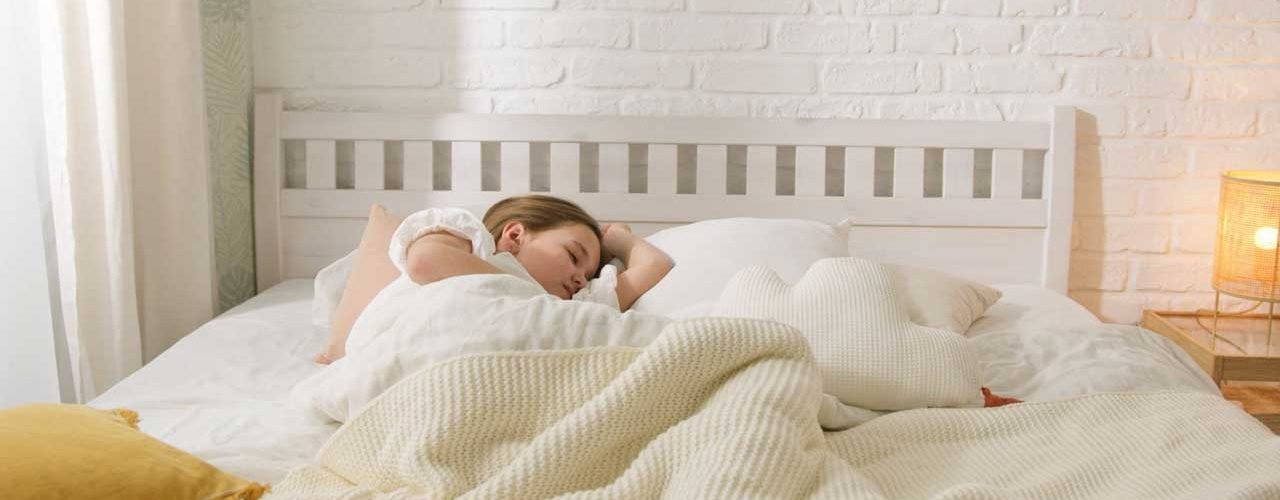Beddings are one of the most important parts of your bed. Quality bedding can really make a difference when you want a good night’s sleep and the better the bedding, the better your quality of sleep.
Bedding is the bed linen or bed cloth that is laid over the mattress to make it more comfortable and hygienic for both the user and the mattress. The bedding usually refers to bed sheets, bed skirts, and comforters. Large bedding sets even come with pillows.
However, the main part of bedding is the bed sheet or bed cover. They have to be breathable, washed easily, and absorb moisture. These qualities can significantly improve your sleep. In this article, we are going to talk about exactly how it does that.
Table of Contents
How Does Bedding Improve Sleep Quality?
Good bedding can help improve sleep in the following ways:

1. They Are Breathable
Breathable bedding means that air can pass through them easily. If air gets trapped inside the bedsheet, it will warm up even more from your body temperature and will end up making you sweat profusely.
Sweating makes it uncomfortable to sleep and you might even wake up in the middle of the night and discover yourself in a pool of sweat. This issue is exacerbated by hot weather. Low-quality bedding will not help and even make things worse.
Beddings can also help during the winter. One of the most important parts of bedding is the bedsheet. The bed sheet offers tactile comfort and maintains the proper balance of breathability and warmth. For instance, luxury sheet sets can trap heat and offer a very comfortable texture to make your sleep cozy.
Breathable bedding is comfortable during the summer and in the winter, you can just add more layers.
When it comes to creating a cozy and timeless bedroom, consider investing in linen bedding twin, which offers not only comfort but also a touch of elegance and durability.
2. They Are Good for Your Skin
Quality beddings are smooth and do not cause any kind of itchiness or irritation when you lie on top of them. If you have sensitive skin, then you should definitely use organic beddings. Organic beddings are made of skin-friendly cotton which is great for everyone, especially newborn babies.
3. Can Help Prevent Allergies
Beddings such as organic beddings are pigment and bleach-free. Meaning they are hypoallergenic and are very unlikely to cause any kind of allergic reaction. People with sensitive skin can rest assured if they use organic beddings since they are also free of harmful chemicals.
Many people have allergic reactions to the metal present in dyes that are used to add color to the bedding. So before choosing your bedding, make sure it is free from any kind of metal.
4. Help Improve Posture
Posture is vital for a good night’s sleep. Large bedding sets come with comfortable pillows which are helpful in maintaining a good posture. Your pillow can support the curve of your neck when you sleep. This helps avoid cramps and discomfort.
If you are a back sleeper, then a soft pillow below the head will let it rest properly. If you are a side sleeper, you will need fewer soft pillows that leave some room for your shoulder. Depending on how you sleep, you can adjust your pillows. If you have a bunch of pillows with different levels of softness, you can organize them to maximize comfort and improve your posture.
How to Choose the Right Bedding
Now that you know the benefits of good bedding, let us look at how you can buy a good one.
1. Thread Count
This is important for the bed sheet or the bed cover. Thread count means how many threads are woven together in one square inch area.
Thread counts are very important when deciding the quality of a bedsheet. The average bed sheet that you can find in most stores has a thread count of 400. These bedsheets are good but if you want something that offers superior comfort, you will have to pick a sheet with a higher thread count such as 600 or 800. The higher the thread count, the more comfortable a bedsheet.
But the limit is usually a 1000-1200 thread count. Any higher and the sheet will be coarse and unconformable. For everyday use, stick to the ones that have a 600 to 800 thread count.
2. Different Materials
The most common materials for bedding are linen, silk, and cotton. Each of these materials has its own pros and cons. For example, linens are cheap and hardly have any wrinkles, but they are not as comfortable as silk.
On the other hand, silk bed sheets are expensive and can wrinkle easily. But they are easy to wash as well. Lastly, cotton is very breathable and does not wrinkle easily but is not durable as silk.
3. Bedding with Duvet Covers
Duvet covers are an extra piece of fabric that comes along with some bedding. They make your sleeping experience much more comfortable because these covers add an extra layer of comfort to your bed.
But there are some downsides to it too. Beddings that come with duvet covers are slightly more expensive but they can make your bedroom look prettier.
4. The Weave Type
There are three types of weaving that you can see in the clothes that come with the bedding. They are sateen, percale, and combed cotton.
Sateen weavings make the fabric soft and comfortable. The downside however is that the fabric is not very durable and can tear apart with rough usage.
Percale weavings create a strong, durable, and long-lasting fabric. These are the ideal weavings for most bedsheets. So try to get bedding that has bed sheets made from percale weaving.
Combed cotton is a hybrid weaving. It has the strengths of both sateen and percale weaving, but the weaknesses of none. Combed cotton bed sheets are made from combing the fabric, which removes the short fibers and leaves the long ones. This makes the bedsheet very soft but sturdy.
Final Thoughts
After a long, tiring day, comfortable bedding can help you sleep better by making you feel relaxed. Be sure to wash your bedding now and then to maintain its comfort factor.





